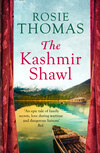Kitabı oku: «The Kashmir Shawl», sayfa 4
THREE
India, 1941
He had taken their candle behind the screen with him. It was only a hinged wooden frame with brown paper pasted across it, and the light, placed on the hidden washstand, threw his enlarged and distorted shadow on to the paper. Nerys turned to face the other way, in order not to see her husband washing himself. She studied instead the plain wooden crucifix that hung on the wall beside the bed.
The yellow glow of the candle flickered as he carried it from the washstand and placed it on the night table, so she knew it was all right to turn on to her back again. The mattress, stuffed with yak’s hair, gave out its familiar rustle as she moved. There was a whiff of carbolic soap with a lingering trace of male sweat as Evan picked up the Bible that always lay next to his pillow. He sank to his knees beside the bed. Nerys at once made a move to push back the blanket and join him in his prayers, but he told her that she should stay where she was.
‘The Lord sees everything. He won’t frown if you take a few more days’ rest, Nerys.’
‘I’m perfectly all right,’ she murmured, but she lay still because she felt so tired. She listened as he read in Welsh from the Book of Job, one of his favourite resorts. ‘Amen,’ she said, when she thought he had finished. There was an interval as he prayed in silence, and she attempted the same herself. Among other things, she asked God if He could somehow make a better wife of her.
At last Evan sighed and got to his feet. He took off his thick dressing-gown and hung it on the hook, peeled back the blanket, letting a blade of cold air into the bed, and hovered for a moment in his striped flannel pyjamas, as if to lie down beside her took a positive effort of will.
‘Are you ready?’ he asked.
‘Yes,’ she said.
He blew out the candle and got in. The mattress sank under his weight and she tensed her hip and leg muscles in order not to roll against him. Not that she didn’t long for the comfort of his arms and the warmth of his skin, because she felt so sad and empty that she craved physical reassurance without any of the pitfalls that words could lead to, but it had been a long day and she didn’t want to place even this much of a demand on him.
‘Goodnight, my dear,’ he said, after a moment.
‘Goodnight, Evan,’ she said quietly.
It would not be long before he fell asleep. She lay with her fingers interlaced across her breastbone and reviewed the day.
The smaller children gave her the greatest pleasure. She loved the sight of them in class, with school pinafores tied over their ragged clothes, sitting in a neat line with their shining eyes fixed on her as she wrote words and numbers on a blackboard balanced on an easel. One, two, three. Boot, hat, apple, hand. They bore this part of the day patiently, just as they did when she read them stories from the Bible, but what they really enjoyed was singing and dancing and clapping games. They chanted their own words to ‘Oranges and Lemons’ and ‘The Farmer’s in His Den’, and she tried to copy what they sang because her efforts made them laugh so uproariously. Or with her harmonium and their drums, whistles and tambourines they pounded out made-up songs that filled the room with rhythm and needed no language at all.
The older children were less rewarding. Nerys knew they only came to school because of the mission’s free midday meal, soup and rice with a thick stew of lentils. They fidgeted and murmured among themselves as she talked, and as soon as the class finished at three o’clock they raced each other across the yard, happy to be free from her lessons even though the rest of the day would be spent working in the fields, or bent over a weaving loom. She could only hope that the food they ate and the minimal medical attention she could offer, for their racking coughs, gummy eyes and running sores, was a compensation for the two hours of mutual incomprehension they shared with her. By the age of eight or nine, most of them stopped coming altogether. They were too valuable to their parents as extra pairs of hands.
Nerys listened as Evan’s breathing slowed and deepened.
However positive she tried to be, it was hard not to feel that they were wasting their time in this place, two ignorant outsiders battling against the primitive conditions, an obscure language and centuries of history.
Of course, Evan wouldn’t have agreed that they were ignorant. But Nerys didn’t share her husband’s absolute conviction that the Word was the only truth, and bringing it to the heathen the only thing that really mattered. She was even afraid that she might be losing her faith altogether, although the mere acknowledgement of this, in silence and under the safe cover of darkness, made her wince with anxiety. How could there be a missionary’s wife who didn’t believe in the Lord?
Ironically, it was India that had brought her to this precipice of doubt.
Back in Wales, she had first met the Reverend Evan Watkins when he was on home leave from his Indian mission and she was in teacher training, and it had all seemed perfectly straightforward. Their God, the one she and Evan shared, was a daily matter, of course. He was Grace said before meals, prayers at bedtime for family and the sick, the King and Queen and the unfortunate heathen. He was chapel on Sundays, the thick black Bible, Nonconformist hymns, and a whole way of life that she was accustomed to and took comfortably for granted. Even after Evan had proposed (and she had hoped – even prayed – that he would ask her), and during their short engagement, the wedding, their honeymoon in Anglesey (she wouldn’t dwell on that now) and all the preparations for India that had followed, she had never questioned the basic premise. Evan had heard the call to do missionary work, and she was proud to be accompanying him. She would help him and support him in every way she could, and they would succeed together.
At Shillong, the centre of the Presbyterian outreach mission to India, where they had lived for their first months of married life, it had not been so very difficult. Within the compound there was a large school run by the mission, where the teaching was excellent and the local families seemed prepared to accept the Christian message that accompanied it. As well as the big chapel, with its regular services for mission families and respectable numbers of converts, there was a medical clinic for first aid and minor ailments, classes for local women in domestic skills, hygiene and vegetable-growing that Nerys had enjoyed helping with, and all the support of a small but determined religious community. There was even, at a little distance, a mission hospital, with a resident qualified doctor and three nurses, where women could come to give birth in safer and more sanitary conditions than were available anywhere else in the area. Lepers were treated there too, and TB patients, and sufferers from septicaemia and rabies and all the other shocking ailments of India. Nerys could see that they were doing some good through their work, she and her husband, even though it was in a small, oblique way.
India itself had shocked her. She had only been able to conjure up the most pallid images in advance so the actual vastness, the brutal heat of the plains, so fierce that it flayed her skin and bleached the skies, the swarming people, the solid torrents of monsoon rain, the harsh colours and stink of it all, the flies, the crippled bodies and the raw poverty she saw every day had almost unpinned her. When she tried to confess her dismay to Evan, he had looked annoyed.
‘The work is what we are here to do, my dear, with God’s help. There is no time for considering ourselves or our misgivings.’
She had begun to retort that she wasn’t afraid of work, and she wasn’t being self-absorbed, she had only wanted to talk about what they both saw all the time. But she had stopped herself. Evan didn’t want to talk about anything except the routine of their days. He had a focus on his work that was so tight, so unwavering, that she began to suspect he was afraid of where speculation might lead him.
In any case, her confusion didn’t last. In time she began to see a vitality in this seething country, a kind of dogged appetite that brought babies bawling into the world amid all the desperation, reflected in the eyes of a beggar as he reached up with cupped hands to receive a half-pice coin, in the backs of women bent double in the fields, and in the man who sat all day beside the churning traffic with his spirit stove, brewing delicious chai to sell to passers-by. Nerys used to stop on her daily walk and drink a cup with this man, sitting on his little three-legged stool while he squatted in the dust. Unfortunately she couldn’t see how any of these people might be affected, for either better or worse, by the Christian message that she was supposed to be bringing them. Their situations were nearly all desperate and they had their various religions already. What difference could a merely different one make?
It was a dry, unwelcome seed that took root in her, but its growth was rapid.
Evan worked all the time, preaching, writing, reading and travelling to outlying villages. Even with teaching at the school and trying nervously to deal with the house servants, whose grinning expectation of her orders she found embarrassing, Nerys had plenty of hours to spare. She began helping out at the hospital where the nurses offered much livelier company than the other mission wives.
Her favourite duty was in the labour and delivery room. Her memory of the first baby she saw being born was as vivid as if it had happened that morning. The mother was younger than she was, had borne two children already and had been screaming for two long hours while Nerys sponged her face and struggled to soothe her. But as soon as he was born she reached her arms out for this new infant with a smile that filled the room. Nerys had had to turn aside and wipe her own eyes with a towel.
Her hands slid lower now, an involuntary movement that she tried and failed to suppress, over the corrugated twin arches of her lower ribs, to rest in the slack bowl beneath them. Since her own first pregnancy had miscarried, less than a month ago, she had tried to tell herself that there would soon be another baby on the way. She felt sick and exhausted, and it had taken more than long enough to conceive this one, but still, they would manage, wouldn’t they?
Unless this was God’s way of punishing her for not believing in Him.
Nerys smiled grimly into the darkness. If she didn’t believe, how could miscarriage now or failure to conceive again at some time in the future be a divine punishment for anything?
Think about something else, she advised herself. Her husband sighed in his sleep and curled on his side, facing away from her.
When Evan had been offered the chance to go all the way up to Leh, where the resident Welsh missionary had died of dysentery, he had explained to Nerys that they did not have to go. They should see it as an offer, an opportunity for greater good, not an order. The posting would be a hard one, he warned. Leh was at a considerable altitude; it could be reached by only two possible roads, and those were closed by snow for at least half of each year. They would probably be among only a tiny handful of other Western people, there was no proper hospital, and the local population were likely to be even less receptive to the word of Our Lord than they were down here in Shillong.
Nerys had looked into his eyes.
Evan wanted to go just because the posting would be difficult and uncomfortable. Leh would give him the chance to prove his missionary zeal to God and to his superiors, while providing him with even more opportunities for self-denial. She was beginning to realise that poor Evan secretly had a low opinion of himself. Doubting the value of what he achieved within the mission, all his conscientious work and insistence on taking the hardest route was probably his way of dealing with an absence of self-confidence and self-love. He wouldn’t even feed himself properly, however hard she tried to devise meals that would nourish him. He was gaunt, and his face had developed hollows beneath the cheekbones. He was often ill, with fevers or stomach complaints.
I will love you more and better, she silently vowed, to make up for what you can’t do for yourself.
She had cupped his face between her hands and kissed him on the forehead. ‘Of course we must go. I’ll be very disappointed if we don’t. Even the journey sounds like an adventure.’ She had already heard the legends of the road from Manali to Leh.
That night in bed Evan had taken her hand and whispered, ‘My dear?’
That was his signal. She had moved closer, her nightdress rucking round her thighs, and murmured, ‘Yes.’ She made sure that her mouth was almost touching his, so he felt the warmth of her breath.
He probably didn’t think that doing it was actually sinful, she reflected. After all, they had been married, in chapel, by Parchedig Geraint Rhys, his friend and teacher, and in front of their two families. It was just – probably – that he didn’t think he deserved this much pleasure. Certainly he never tried to prolong the act, or to intensify the sensations for either of them. He submitted to the base urge, as he no doubt thought of it, then detached himself as quickly as possible.
For herself, Nerys didn’t care whether she deserved pleasure or not, but she knew from the very first fumbling time her husband came into her that she loved sex. At the beginning she had tried to imagine a marriage where both of you liked it equally and wanted it as much as she did. You’d never get out of bed, she thought. After two years of marriage, she had learnt to keep her imagination under stricter control.
Evan accepted the Leh posting, and the Watkinses made the long journey up into Ladakh. Nerys enjoyed the train journeys to Calcutta and on to Delhi, even though the summer heat of the plains was crushing after the relative airiness of Shillong. At every station food vendors clambered into their carriage with tiffin baskets containing rice and curries, chai men rang their little bells, and women imploringly held up cloth slings filled with ripe fruit to the dust-coated windows. She bargained for these goods along with the other train passengers, and arranged little picnic meals in a white napkin to tempt Evan whenever he glanced up from his book. And for hour after hour she gazed out at India as it rolled past the train. Paddy fields, buffalo carts and mud villages gave way to sweltering towns and cities of blistered slum tenements, and ever more hopeless camps where families lived under a tattered canvas awning on one patch of dirt beside the railway lines, with the smoke of countless fires thickening the already viscous air. Then the train would steam out into the countryside again, edging across a vast brown plain as if the acrid city had never existed.
In Delhi they were staying in a missionary house when Nerys finally heard the news of the Dunkirk evacuation on the BBC Overseas Service. Awaiting her were letters from her parents, containing accounts of air raids and food shortages, and of little boys she had known at school who now appeared on lists of men killed in action. It was hard to hear of the terrible changes that her known and loved world was undergoing when she was in such a strange place herself. Anxiety for the people she had left behind filled her thoughts, and India and their work there seemed even more unrelated to anything she understood. She ached to go home; the depth of her longing was physical, almost frightening. Evan came back one afternoon from a mission meeting and found her struggling to breathe at an open window, although the air outside was dense with soot and heat. A woollen sock she was knitting lay on the floor beside her. She had heard that it would be cold crossing the passes on the way up to Leh, and although the notion of chill seemed to have slipped out of the world altogether she was worried in an abstract way that they did not have enough warm clothing.
‘I think we are ready to leave.’ Evan frowned, choosing either not to see or not to remark on her distress. ‘I shall order the tickets for Chandigarh.’
With the advice and help of the Delhi mission they had accumulated a mountain of supplies, ranging from thick felt boots and blankets to tins of butter from the Delhi Dairy Company. Everything had been packed into travelling baskets fastened with leather straps.
Nerys stooped to pick up her knitting. ‘Are we doing the right thing, Evan? Do you ever worry that … that our efforts might be better expended at home?’
He put down his armful of papers and books. ‘Because of the war?’
‘Yes.’ If they were at home, she supposed, her husband would be a forces’ chaplain and she would be school-teaching in the place of men who were away fighting.
‘I have been called here, Nerys. I know that I am doing God’s will.’
That’s all very well for you, she almost retorted, but what about me? I don’t know anything of the kind. What is God’s will for me?
She had never once actually asked him.
She had always bitten her tongue, knowing that the only safe direction for the conversation to take was for her to agree that she was Evan’s wife, and her duty was to be no more or less than that. In any case, all of this, every step that had brought her here, had been her own choice. If she had not chosen to marry him she would be at home in Wales, and tomorrow she would be a spinster schoolteacher making her way to a classroom full of children whose lives she could comprehend, instead of a married woman on her way to Ladakh.
Through the window came the noise of vendors shouting, street children playing in the gutter, a baby’s wail, the tinny notes of amplified music. Nerys stood very still, her fingers feeling like melted wax on the knitting needles.
‘Are you unwell?’ Evan laid his hand on her shoulder. ‘Would you like me to call Mrs Griffiths?’
Mrs Griffiths was their hostess, a Delhi missionary wife whom Nerys hardly knew. ‘No, thank you, Evan. I’m not ill. I agree with you. We’re ready to go, so you should get the train tickets.’
At Chandigarh they left the train and travelled overland by truck, with their luggage roped under canvas on the flat bed of the vehicle, up to a town called Manali. There was another outpost of the mission here and Evan had to arrange the last details connected with their posting to Leh, so they stayed for three days. Manali lay in the foothills of high mountains and the blissfully cool air was crisp and sweet-smelling. The folded ridges that rose above the valley were covered with dark pine trees. The views made Nerys think of Switzerland, although she had never been there. She went for walks beside a crystal stream and watched eagles gliding over high crags. Her spirits lifted like the birds.
On their last evening, she and Evan ate dinner by candlelight in a little wood-panelled room overlooking a garden. When he put down his knife and fork she jumped up and went to him, resting her arms over his shoulders and putting her cheek against his hair. ‘I am so glad we’re going. I’m sorry I doubted the wisdom of it,’ she whispered.
‘I prayed you might have a change of heart,’ he answered.
Nerys knew that night would be their last in a proper bed until they reached Leh. She had learnt on their honeymoon that she must never make any overtures to her husband, but while he was out of the room she touched a dab of perfume to the nape of her neck and put on her wedding nightdress.
‘My dear?’ Evan asked, as soon as he blew out the lamp.
At first light the next day, a train of fifteen ponies assembled. It took two hours for all of Nerys and Evan’s baggage to be unpacked and redistributed into separate loads that were shared out between the pony men and their animals. A wiry little man called Sethi was in charge of their caravan. It was three hundred miles from here to Leh, over an ancient trading track that crossed the Himalayas. They would ride, and camp each night along the way.
‘Come, Memsahib.’ Sethi helped Nerys into the saddle of her pony, put the woven bridle with its bells and pompoms of bright wool into her hands, and slapped the animal’s rump. It started forwards and their procession wound out of Manali. Thirty miles of steep ascent lay ahead, to the first high pass on their route.
Nerys often thought back with a kind of dizzy disbelief to the rigours of that long journey. The days were a blur of jolting on the back of the pony, or dismounting with aching legs and numb buttocks to trudge in its wake. The track was often no more than a gash leading between tumbled rocks, or a muddy ledge perched over hundreds of feet of empty air with a silver river winding far below. The ponies picked their way along, encouraged by clicks and whistles from the pony men. Their loads rhythmically swayed, sometimes tipping far out over the void. At night Sethi and his men pitched the tent and Nerys and Evan crawled inside and rolled themselves in their blankets. Cold winds battered the canvas and sliced between the tent wall and the groundsheet. The cook-boy lit a fire and in time a tin billycan of mutton stew and another of steaming rice would be passed through the tent flap. Nerys had never felt so hungry in her life. She ate ravenously, devouring everything that was given to her. Evan lay in his blanket cocoon with his eyes closed. He suffered from the high altitude, waking up every morning with a headache and coughing weakly all through the day. Nerys dosed him with aspirin and cough mixture, and coaxed him to eat.
‘Just a spoonful of rice, dear. You must have some food, or you won’t have strength to do your work when we arrive.’
He raised himself on one elbow, and ate a small amount of his dinner.
They slept fitfully at night, propped up on saddles to ease their breathing, waking to the sound of the wind or the men talking and chuckling round their fire. In the morning the whole process started all over again.
But as the days passed Nerys found that she grew steadily stronger, and with the strength came a new happiness. She gazed at the changing scenery, thinking of how its barren grandeur dwarfed the peaks and valleys of Snowdonia yet reminded her of home. She realised that she felt more at ease in this inhospitable landscape than she had done anywhere in boiling lowland India. She joked with the pony men, using sign language because they had hardly a word in common. Sethi became her ally, riding just ahead of her on his shaggy white pony or patiently leading her mount when her aching body protested too much and she had to climb down and walk for two or three miles.
‘Memsahib very strong,’ he said meaningfully. He didn’t even glance at Evan, drooping over his pony’s reins.
Nerys knew that she would never forget the afternoon of the long, gasping climb up to the Baralacha Pass. When at last she staggered up to the highest point, at sixteen thousand feet, it was as if all the oxygen had been sucked out of her brain and her blood, leaving her whole body as limp as string. Evan was grey and gasping, hardly able to sit in his saddle. A man had to walk on either side of his pony to support him.
Then Nerys looked back. Behind her, to the south, stretched the whole of India. She turned in a half-circle. Ahead, to the north, lay the unknown territory of Asia. She straightened up and sucked in a deep breath of the glassy air.
Sethi was watching her. ‘Welcome, Memsahib.’ He smiled.
The days of riding, camping, sleeping and riding again drew on, and then suddenly they were done. Their little caravan wound up a low hill, and at the crown they found themselves looking out over the Indus valley. There were orchards and walnut trees and cultivated fields stretching along the riverbanks. The town of Leh spread over a sunny slope facing a range of high, white-iced mountains.
It was the end of August, and more than a month had gone by since they had left Shillong. As they rode into Leh, passing pony carts loaded with sheaves of dried barley stalks, flocks of goats, and women walking back from the fields, Nerys thought of the cold sliding down the mountains behind them and tightening its grip on the passes they had just crossed. Already there had been snow higher up, melting into slush in the midday sun and refreezing into treacherous ridges as soon as the dark came. Once they had unloaded their ponies the men would set out again for Manali, travelling fast and light against the weather, but the slow journey Evan and Nerys had made couldn’t be reversed. Not until winter had come and gone again.
Here we are, Nerys thought, as they passed to the left of a long mani wall on the outskirts of town. Thousands of carved stones were piled on it, each one engraved with the mantra Om mani padme hum. She bowed her head respectfully towards the wall. Here we are, and here we shall stay.
That had been almost a year ago.
Nerys turned to lie in the same position as Evan, but not quite spooned against his body in case she disturbed him. She inhaled his soap-and-sweat smell. Now that he was deeply asleep, she would complete her review of the day by considering this evening.
They had been eating their early dinner. Diskit, the woman who cooked and served their food, had withdrawn to the kitchen. She had been widowed and left with a young family so she was glad to be attached to the mission, whatever religious allegiance it obliged her to demonstrate. They could hear her opening the door to stir the ashes in the iron cooking stove, then piling in more yak-dung fuel to cook tomorrow’s stew for the school. The smell of boiling mutton drifted in to them. Evan turned a page of his book. Without even glancing at him, Nerys knew that a shadow had crossed his face. The homely kitchen sounds set up a chain of unwelcome associations in his mind.
The early Moravian missionaries had arrived in Leh in 1853, before the Catholics and long before the fledgling Welsh Presbyterians. They had established themselves successfully. They had introduced the sturdy little stove that was now a fixture in every Ladakhi kitchen, set up the first printing press, and the post office, and had translated the Bible into Tibetan.
Evan felt keenly the precarious position of their own much younger mission, and the pitiful size of his congregation compared with the numbers who made their way to worship at the Moravian church. He condemned himself for his lack of achievements, practical as well as spiritual.
‘You don’t have to think of it in that way. They are our Christian brothers, and we are doing the same work,’ Nerys had once said.
Their fellow missionaries were currently an Englishman, who had spent all his ordained life working for the Moravian church in India and was soon to retire, and a middle-aged Belgian couple. For the endless months of the winter they had been almost the only other European residents in Leh, and Nerys had grown to like all three of them. It had been Madame Gompert, with Diskit, who had nursed and comforted her through the blood and grief of the miscarriage.
She hadn’t said anything this evening, and it had been Evan who had put down his knife and fork and closed his book. ‘Nerys, I have something to discuss with you.’
‘What is it?’
‘It will soon be winter again.’
She could hardly be unaware of that. This year, now she knew about the depths of cold and silence, the monotony of eating the same food, the frozen water in their washing jugs, and the isolation of their little world, she thought that she would deal with it better. ‘Yes.’
‘I can’t sit here in the mission all that time. In summer when I go out to villages and the nomad camps, the people are almost all out with the herds. But if I went in the winter, do you see, they would be in the settlements. They will have less work to do and I would have their attention.’
Nerys considered this. There were tracks out to villages in the valley, and hazardous routes over the mountains to outlying gompas and clusters of huts surrounding them, but she could only just imagine what it would be like to travel through snow and wind when the temperature fell to nought degrees Fahrenheit.
‘I’ll come with you,’ she said.
Evan was silent.
Look at me, she willed him. At last their eyes met.
He wasn’t hostile towards her, neither did he blame her in the least, but the loss of the baby had tipped them over the lip of a divide. As much as he had wanted the child, Evan also needed her to be strong and dependable in the joint enterprise that preoccupied him. Her physical frailty since the miscarriage and the unspoken weighty mass of her sadness suggested that her strength was no longer available for him to draw on. In some recess of his consciousness he resented the withdrawal, and that resentment must loom in his mind as yet another of the personal failings he was obliged to atone for.
They were at an impasse, Nerys wearily concluded. They couldn’t talk to each other: it had been his child as well as hers and, of course, Evan grieved for it, but he put up too many defences against her and she had lost the will to try to break through them. She felt the beginnings of anger, too, at his weakness, which was so determinedly masked with stubbornness.
‘I couldn’t agree to that,’ he said, in his most wintry voice. ‘You must take better care of yourself than I could undertake to do if we were both out in the field.’
Nerys looked away from him. She closed her mouth, knowing that it made a tight line in her white face. ‘You would prefer it if I stayed here alone?’










